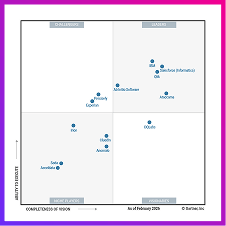Ataccama vs Informatica (2025 Comparison)

Ataccama vs Informatica: Which one is the best option for you?
Choosing the right data management platform can significantly impact your business efficiency and agility. Ataccama and Informatica are two leading solutions, both recognized in Gartner’s Magic Quadrant, each offering distinct strengths. This blog provides a detailed comparison, highlighting core features, capabilities, and differences between these two platforms to help you make an informed decision based on your specific needs.
What is the difference between Ataccama vs Informatica?
Ataccama and Informatica differ fundamentally in their approach:
| Feature | Ataccama | Informatica |
|---|---|---|
| Platform integration | Unified, built in-house | Fragmented due to multiple acquisitions |
| Data quality | AI-driven automation, anomaly detection | Manual, rule-based |
| Master data management | Embedded data quality, high scalability | Complex integration, resource-intensive |
| User experience | Modern, intuitive, unified UI | Multiple interfaces, outdated modules |
| Deployment | Flexible cloud-native & on-premise | Different architectures for cloud/on-prem |
| Customer support | Proactive, business-focused | Slow, expensive, consultant-dependent |
| Licensing & pricing | Transparent, predictable | Complex, opaque, unpredictable |
Platform integration & architecture
- Ataccama ONE provides a unified data trust platform, seamlessly integrating data quality, governance, master data management, and observability. Ataccama has been built entirely in-house from the ground up. Its cohesive architecture allows smooth implementation and adaptability to evolving business needs. Learn more about the Ataccama platform.
- Informatica product has been built from numerous acquisitions. It struggles with integration complexity due to its fragmented suite, often requiring extensive technical resources to manage and maintain effectively.
Data quality capabilities
- Ataccama utilizes industry-leading AI-driven anomaly detection and automated remediation, drastically reducing manual efforts and improving data quality efficiently. It also offers a free Data Quality app in Snowflake AI Data Cloud, enhancing ease-of-use. Read more about the importance of data quality and explore Ataccama’s data quality software.
- Informatica provides strong traditional data quality features, including profiling, monitoring, and rule management. However, it heavily relies on manual rule creation, making it less effective for large-scale or complex data quality scenarios, potentially leading to increased resource consumption and operational inefficiencies.
Master data management capabilities
- Ataccama excels in flexibility and scalability, embedding data quality functions directly within MDM. Its powerful matching and merging capabilities handle large data volumes seamlessly. Explore Ataccama’s MDM Software or the master data management guide.
- Informatica offers a robust functionality for basic master data management tasks like matching, linking, and merging master data records but faces scalability and integration challenges with MDM, resulting in lengthy implementation cycles and a steep learning curve, heavily reliant on expensive professional servicesces.
User experience & interface
- Ataccama features a modern, unified, intuitive user interface, built in-house and designed for ease of use across technical and business users. This eliminates the need to navigate between multiple applications. Workflows are streamlined and features are deeply integrated—making it easy to collaborate, automate, and act on data with confidence.
- Informatica often offers outdated interfaces and a fragmented experience, forcing users to switch frequently between different applications.
Deployment options
- Ataccama supports cloud-native, private cloud, and self-managed (on-premise) deployments with consistent features across all environments, giving organizations the flexibility to choose the model that best fits their infrastructure.
- Informatica exhibits significant differences between on-premise and cloud versions, complicating hybrid strategies and migrations.
Customer support
- Ataccama offers proactive, business-aligned support, including technical and strategic advisory services. It’s designed to help organizations implement best practices, align on strategic goals, and drive measurable business outcomes from day one.
- Informatica often involves slow and costly support processes, necessitating third-party consultant assistance and extensive internal resources.
Licensing & pricing
- Ataccama provides transparent, predictable pricing based on power users, processed assets, and mastered records. There are no hidden costs or unpredictable charges.
- Informatica employs a complex pricing model that frequently leads to unexpected costs and difficulty forecasting expenditures.
Ataccama: Where it stands out
Ataccama is especially beneficial for organizations seeking a unified, agile, AI-driven platform with an excellent user experience, flexible deployment, and clear pricing. Its seamless integration and proactive support accelerate data-driven business success.
Informatica: Traditional strengths
Informatica maintains market leadership due to its longstanding presence and extensive tool suite, suitable for businesses with significant existing Informatica investments or legacy requirements.
Ataccama vs Informatica: Which should you choose?
- Choose Ataccama if: You desire a modern, unified, AI-enhanced solution, prefer predictable costs, value intuitive UX, or are building a new data stack.
- Choose Informatica if: You have extensive legacy investments in Informatica, specific niche needs, or a highly skilled Informatica-experienced team.
See how Ataccama works!
Your choice between Ataccama and Informatica ultimately depends on your specific business needs, future data strategy, and budget. Consider conducting demos or proof-of-concepts to ensure the best fit for your organization. Explore the Ataccama platform and schedule a demo today.
David Lazar
David is the Head of Digital Marketing at Ataccama, bringing eight years of experience in the data industry, including his time at Instarea, a data monetization company within the Adastra Group. He holds an MSc. from the University of Glasgow and is passionate about technology and helping businesses unlock the full potential of their data.
